Page 1 of 2
Fossil diatom deposit in Jerez. Moronitas
Posted: Sat Oct 16, 2021 4:47 pm
by Gmeiro
Fossil diatom deposit in Jerez.
A good part of the surface of the Guadalquivir valley in Spain and especially the area of the famous sherry wines is made up of fossil remains of diatoms, radiolarians, foraminifera, spicules, etc ...
The whitish soils are popularly known as Moronite and in some cases it is exploited commercially. The age of the deposits ranges from the Oligocene to the Upper Miocene. The extent and variety of these deposits is comparable to those of Oamaru in New Zealand, but they are much less studied. Recently, in the company of a colleague, Beltran Peña, who works in one of the Jerez wineries, we have begun the study of the different species of the site. Beltran does it with an optical microscope and I with an electron microscope. We will be putting here the species that we locate and in many cases we will ask you for help to identify others. I hope it's of interest.
Of course we have samples to share ...
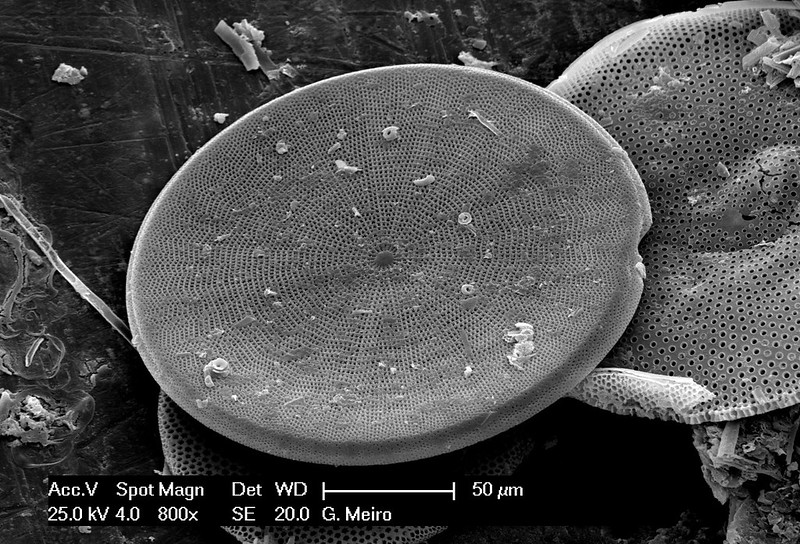
Arachnoidiscus

Arachnoidiscus.
Salud!!
Re: Fossil diatom deposit in Jerez. Moronitas
Posted: Sat Oct 16, 2021 8:09 pm
by 75RR
.
Very fine images. Thanks for sharing them
Re: Fossil diatom deposit in Jerez. Moronitas
Posted: Sat Oct 16, 2021 11:05 pm
by josmann
Cool! Do you have to sputter these before imaging?
Re: Fossil diatom deposit in Jerez. Moronitas
Posted: Sun Oct 17, 2021 10:20 am
by MichaelG.
Wonderful SEM images …
For our education [or perhaps our comfort] : Could you please also share some from your colleague’s optical microscopy.
The comparison should be interesting.
MichaelG.
Re: Fossil diatom deposit in Jerez. Moronitas
Posted: Sun Oct 17, 2021 5:05 pm
by Mr Galasphere
Fantastic image!
Please check for a Private Message
Re: Fossil diatom deposit in Jerez. Moronitas
Posted: Mon Oct 18, 2021 8:27 am
by Gmeiro
To prepare the samples, the material is slipped into water and sieved to discard the broken diatoms. Some of the selected material is placed in a sample holder and by sputering it is covered with a layer of about 10 nm of gold. I have tried to use ionic liquids instead of sputtering, but the result does not satisfy me.
I have invited my colleague Beltran Peña to participate himself and put his optical microscope images here.
While both a beautiful specimen of Anthocyrtidium euryclathrum

Re: Fossil diatom deposit in Jerez. Moronitas
Posted: Mon Oct 18, 2021 9:21 am
by MichaelG.
Oh how I want to produce images like that !!
MichaelG.
Re: Fossil diatom deposit in Jerez. Moronitas
Posted: Mon Oct 18, 2021 11:56 am
by MicroBob
Our group has a SEM, an old Leitz from about 1970. Here you can find images that were made with it:
The instrument and insect images:
http://www.mikrohamburg.de/HomeRem_1.html
Diatoms:
http://www.mikrohamburg.de/HomeDiatomeen.html
Stereo images of radiolaria:
http://www.mikrohamburg.de/HomeStereo.html
Foraminifera:
http://www.mikrohamburg.de/HomePalaeo.html
We have just moved the instrument to a new place, heavy beast with lots of cables. Even the little oil absorber of one of the vaccuum pumps felt as if firmly connected to the ground....
I hope is has survived the move to the new location.
Bob
Re: Fossil diatom deposit in Jerez. Moronitas
Posted: Mon Oct 18, 2021 4:49 pm
by 75RR
Great image of a radiolaria
MicroBob wrote: ↑Mon Oct 18, 2021 11:56 am
Our group has a SEM, an old Leitz 1600 from about 1970. Here you can find images that were made with it:
That is pretty cool. What are the maintenance/running costs like?
Re: Fossil diatom deposit in Jerez. Moronitas
Posted: Mon Oct 18, 2021 5:14 pm
by MicroBob
I didn't have much to do with it actually. A few times professional maintenance was needed, but much was done by a group member. The digital image capture was developed by the son of one member, it uses a PC soundcard to generate the image. Cathodes have to be replaced from time to time and cost 50€ or so each. We have a stack of spare parts the maintenance man brought to us when he put other instruments out of use. For home use one would have to be fairly dedicated, it takes up about 5 m² space without the room you need to operate it. The microscope, control unit, vaccuum pump, sputter and again vaccuum pump weigh more than 500 kg so not all floors will do. In case of a serious defect one might have no other option than to scrap it as parts availability will be limited. What I find astonishing is that a 50 year old SEM can still work today and give nice results by todays standards, not in comparison with newer models of cause. Most stuff that is 20 years old is dead by now...
Re: Fossil diatom deposit in Jerez. Moronitas
Posted: Tue Oct 19, 2021 8:36 am
by Gmeiro
In the "moronites" of Jerez, the number of species is very large, although some species are difficult to find, which is not the case with these Triceratium. Although I have doubts as to whether they are Triceratium or Pseudotriceratium.

[/url]

Salud!!
Re: Fossil diatom deposit in Jerez. Moronitas
Posted: Tue Oct 19, 2021 12:58 pm
by Hobbyst46
Re: Fossil diatom deposit in Jerez. Moronitas
Posted: Tue Oct 19, 2021 3:07 pm
by Gmeiro
Re: Fossil diatom deposit in Jerez. Moronitas
Posted: Tue Oct 19, 2021 3:25 pm
by MichaelG.
Beautiful !!
Thanks for having the patience, and for generously sharing your results.
MichaelG.
Re: Fossil diatom deposit in Jerez. Moronitas
Posted: Tue Oct 19, 2021 6:00 pm
by MicroBob
I like the comparison of SEM images and light microscope images. The light microscope is more forgiving when it comes to cleanliness of the objects and shows colours too. But some structure detail remains invisible, making the whole thing difficut to understand. Many diatoms have more than one pore layer, like the one in the beginning of this thread. With the SEM image in my head I can enjoy the light microscope image better...
Re: Fossil diatom deposit in Jerez. Moronitas
Posted: Wed Oct 20, 2021 8:13 am
by Gmeiro
It's true, the complexity of a diatom is incredible. In this image you can see a break in a frustula showing its internal structure

Salud!!
Re: Fossil diatom deposit in Jerez. Moronitas
Posted: Wed Oct 20, 2021 8:29 am
by MichaelG.
What a magnificent, and informative, image !
MichaelG.
Re: Fossil diatom deposit in Jerez. Moronitas
Posted: Wed Oct 20, 2021 8:39 am
by MicroBob
Great and very informative image! This fine detail gives a lot of room for speculation when observin with the light microscope.
Re: Fossil diatom deposit in Jerez. Moronitas
Posted: Wed Oct 20, 2021 7:40 pm
by Gmeiro
Thanks for your comments.
Continuing with the study of the Jerez fossil deposit, I show some images of coccoliths of the genus Calcididiscus (I think). In the first image you can see the abundance of coccoliths. The presence of cococliths indicates that the waters that flooded these areas were marine.
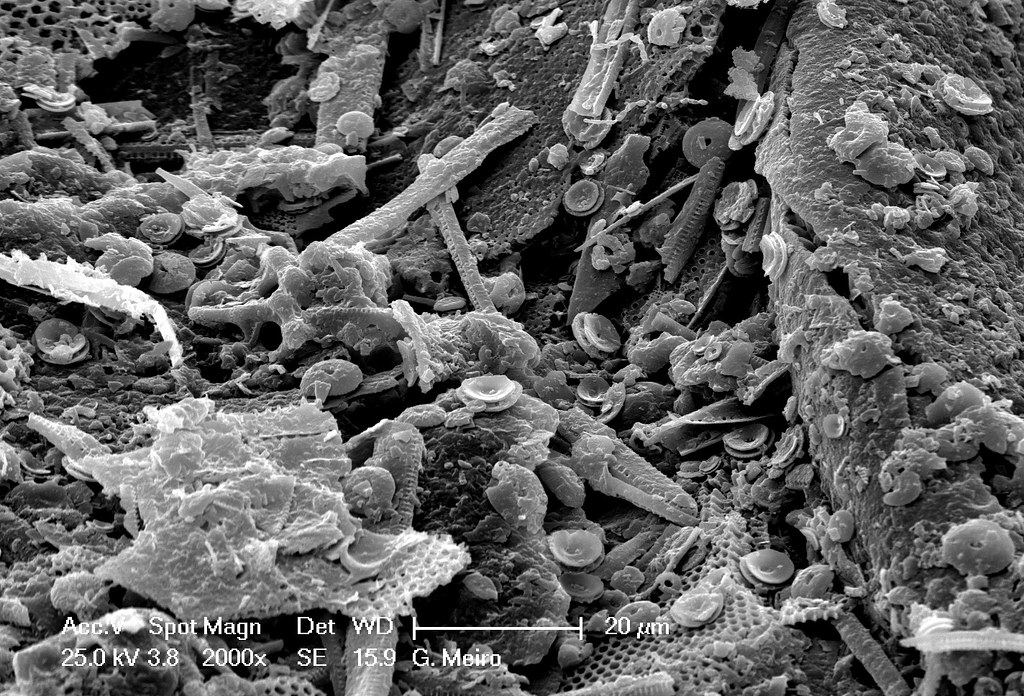



Salud!!
Re: Fossil diatom deposit in Jerez. Moronitas
Posted: Wed Oct 20, 2021 10:41 pm
by MichaelG.
The first image in this group looks like the ruins of some fallen building … and then we realise the scale.
The fractal detail of planet Earth is truly astonishing.
MichaelG.
Re: Fossil diatom deposit in Jerez. Moronitas
Posted: Fri Oct 22, 2021 11:14 am
by Gmeiro
In some places the abundance of diatom remains is extreme, as can be seen in the image with many large Coscinodiscus that can be seen even with the naked eye.

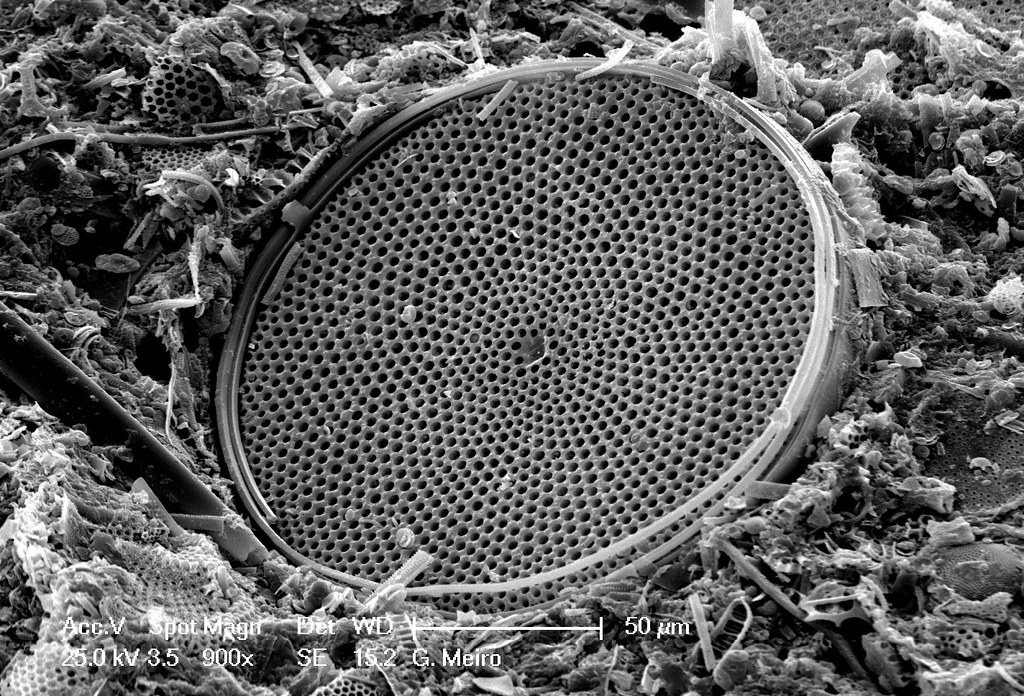
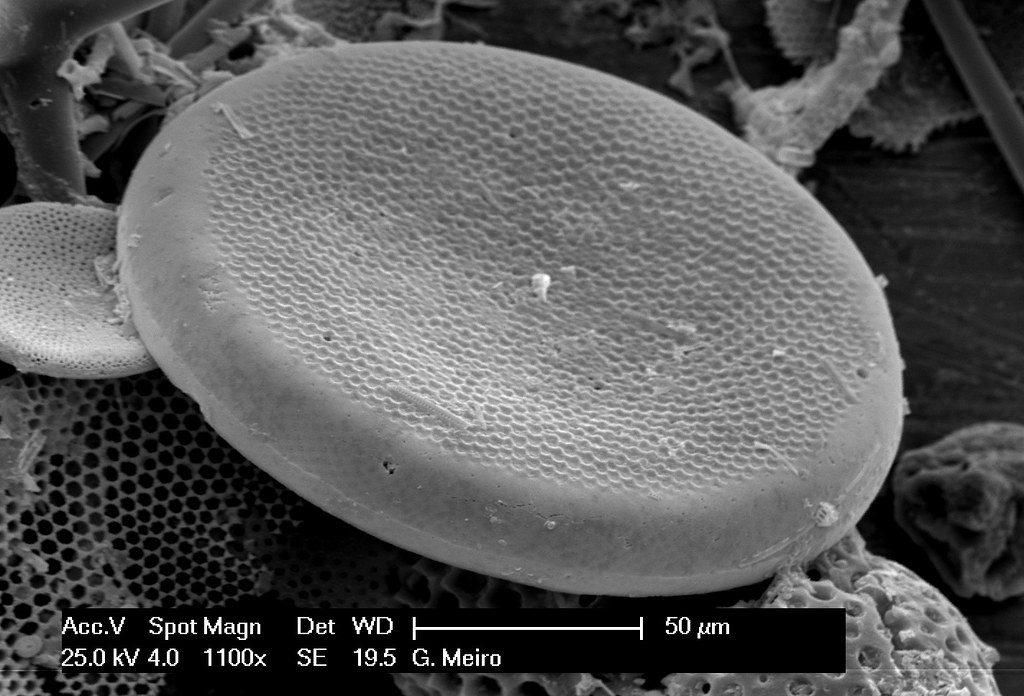
Salud!!
Re: Fossil diatom deposit in Jerez. Moronitas
Posted: Fri Oct 22, 2021 12:58 pm
by 75RR
Gmeiro wrote: ↑Tue Oct 19, 2021 3:07 pm
They are not very abundant but with patience you can find these orthosiras

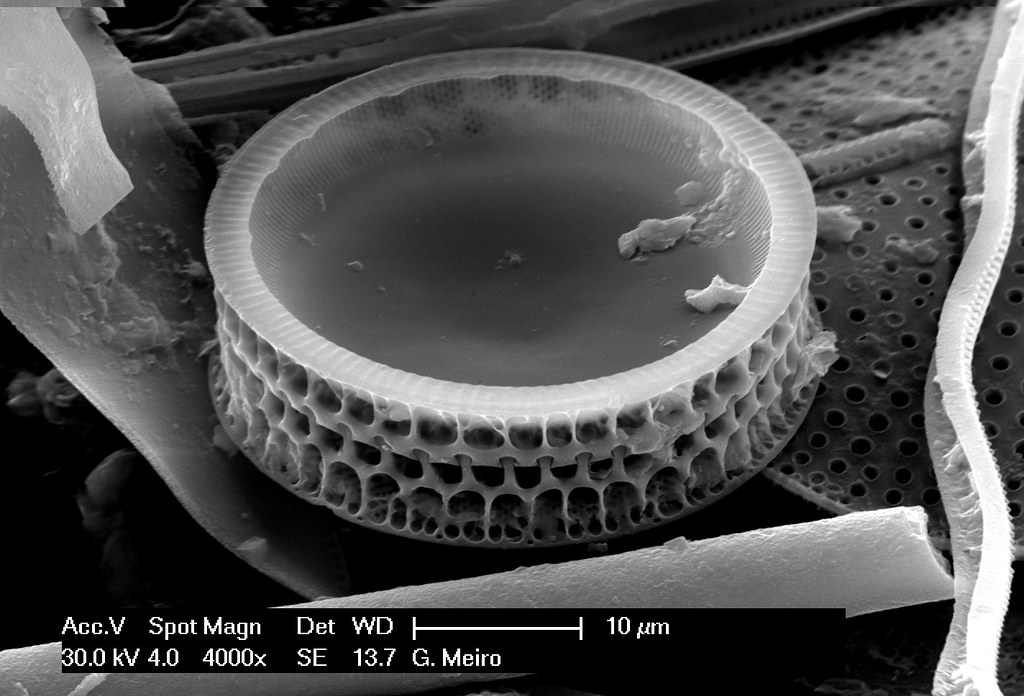
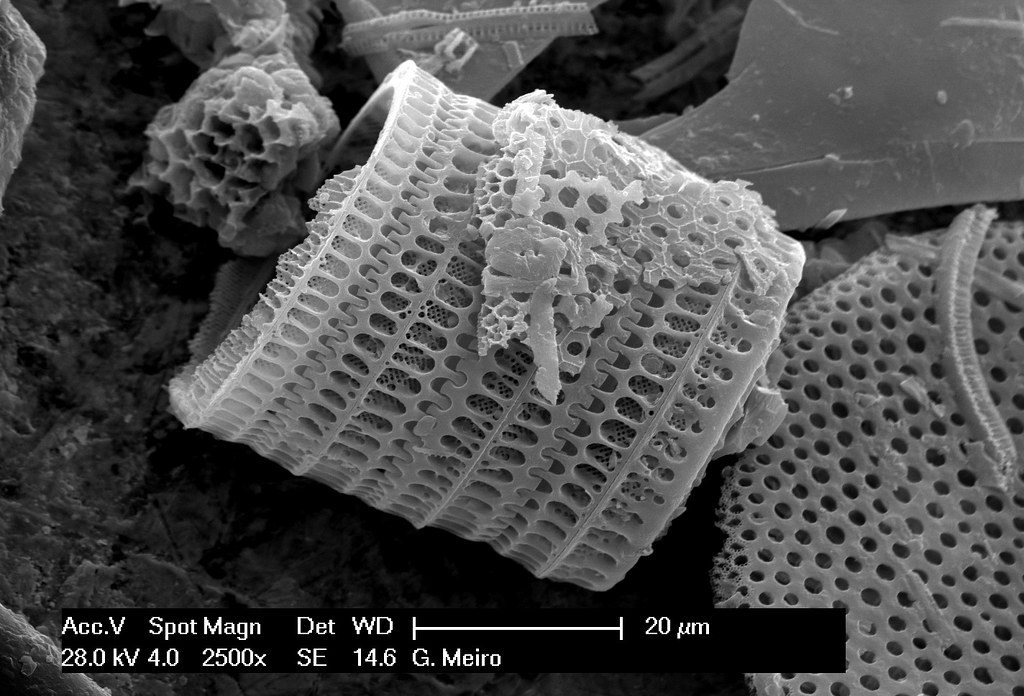
.
These are quite simply amazing!
Can't find much info on them - in fact this is all I have found so far ...
.
Re: Fossil diatom deposit in Jerez. Moronitas
Posted: Mon Oct 25, 2021 12:26 pm
by Gmeiro
An abundant species is the Hemidiscus cuneiforme

Salud!!
Re: Fossil diatom deposit in Jerez. Moronitas
Posted: Mon Oct 25, 2021 2:33 pm
by zzffnn
Stunning! Thank you for sharing.
Re: Fossil diatom deposit in Jerez. Moronitas
Posted: Mon Oct 25, 2021 4:38 pm
by MichaelG.
I am running-out of words to express my admiration
… but please keep these images coming !!
MichaelG.
Re: Fossil diatom deposit in Jerez. Moronitas
Posted: Mon Oct 25, 2021 4:42 pm
by MicroBob
Very nice image again!
Your SEM images have a very nice tonality, like a large format image.
Re: Fossil diatom deposit in Jerez. Moronitas
Posted: Fri Oct 29, 2021 5:00 pm
by Gmeiro
Tanks a lot
[

detail of the interior of a hemidiscus valve
The remains of spicules are very abundant

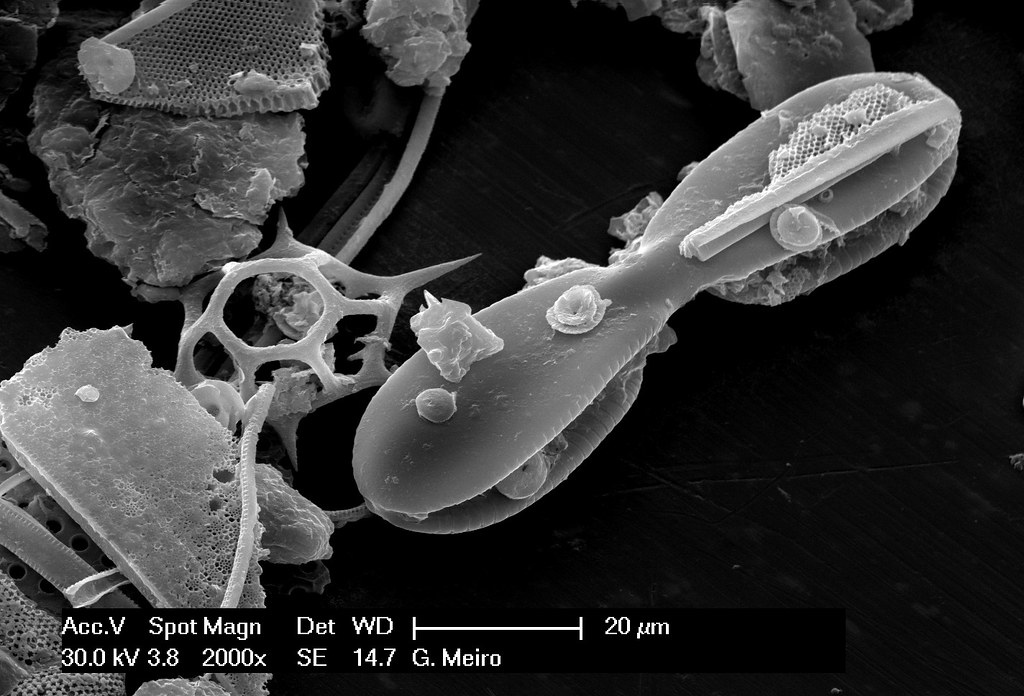

Salud!!
Re: Fossil diatom deposit in Jerez. Moronitas
Posted: Sat Oct 30, 2021 6:47 pm
by 75RR
.
Very nice!
Can you confirm whether indicated areas are Rimoportulae or Pseudonodulus? (See below)
Also, what process do you use to separate the diatoms from the Diatomaceous earth.
And last but not least, how does your sample offer work?
Gmeiro wrote: ↑Sat Oct 16, 2021 4:47 pm
Of course we have samples to share ...
.
Re: Fossil diatom deposit in Jerez. Moronitas
Posted: Sat Oct 30, 2021 7:30 pm
by Dubious
Amazing images!
Re: Fossil diatom deposit in Jerez. Moronitas
Posted: Tue Nov 02, 2021 4:14 pm
by Gmeiro
The selected Jerez deposits are composed of almost 100% remains of diatoms, radiolaria, foraminifera, silicoflagellates and coccolithophores. It has so little consistency that it easily slides in water, separating its components. The faded material can be filtered with different meshes to select the parts that interest us and also eliminate the small pieces of diatoms, since as expected, there are many fragments.
in the case of Hemidiscus they are rimoportulae.
Regarding the exchange of samples, give me a private and I will tell you.
Salud!!





 [/url]
[/url]















